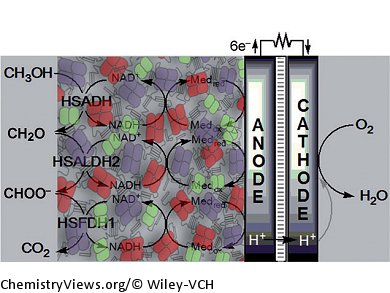Three dehydrogenase enzymes have been engineered so that they self-assemble to form a catalytic biomaterial that can oxidize methanol to carbon dioxide and can be used in enzymatic biobatteries.
Scott Banta and co-workers at Columbia University and the University of Utah, both USA, took three different NAD(H)-dependent dehydrogenase enzymes and modified them so that they self-assemble to form a hydrogel in which their individual catalytic performance is either retained or enhanced. The combination of the three enzymes allows a synthetic metabolic pathway to take place that results in the oxidation of methanol to form carbon dioxide. The enzyme mixture was then used in biobattery anodes.
The team fabricated two batteries, one type where the enzyme concentration is dilute and hydrogels do not form, and the other type where hydrogels are formed. The two types of biobatteries made from this system show comparable power and current densities to similar previously reported systems.
The authors point out that their system may be advantageous as the enzymes can be easily produced on large scales, and this approach can be applied to other enzymes.
- Complete Oxidation of Methanol in Biobattery Devices Using a Hydrogel Created from Three Modified Dehydrogenases,
Yang Hee Kim, Elliot Campbell, Jiang Yu, Shelley D. Minteer, Scott Banta,
Angew. Chem. Int. Ed. 2013.
DOI: 10.1002/anie.201207423



